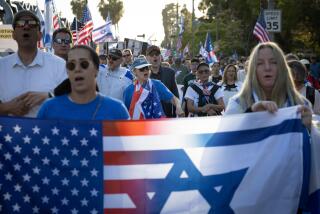Group on Crusade to Say Sorry--900 Years Later
- Share via
JERUSALEM — It’s been 900 years since the knights of the Crusades pillaged and plundered their way through this part of the world in an ultimately unsuccessful effort to capture the Holy Land from its Muslim rulers.
But the legacy of such wanton destruction lives on. That, at least, is the way a group of American and European Christians sees things, and they returned to the scene of the ancient crime to apologize.
Several hundred participants in a “Reconciliation Walk” have spent the last three years retracing the steps of the first Holy Crusade from Germany, through Turkey, Syria and Lebanon. They wound up in Jerusalem this past week to mark the 900th anniversary of the Crusaders’ invasion of this still-disputed holy city.
“We wanted to express our sorrow for the past,” said Mark Elliott, 43, a Nashville minister who with his wife, Beverly, and other “repentees” strolled through Jerusalem’s walled Old City, praying and distributing printed leaflets containing an apology for the Crusades.
In a land where the past is so present, it may not be too jarring to say you’re sorry for something that happened so long ago. In fact, the biggest suspicion that the Christians, clad in matching T-shirts and comfortable shoes, had to confront was that they might be evangelicals. The brochures they were handing out were stamped with a much-needed advisory: “This is not an attempt to convert you.”
“People here get pretty tired of Christians coming at them with tracts,” explained Cathy Nobles, 48, of Austin, Texas, who serves as training director for the walk.
The reconciliation walkers, some of whom joined the tour only this summer, delivered their message to Jews, Muslims and Eastern Orthodox Christians, meeting with religious leaders of the three faiths as well as average people on the streets.
They were greeted with a fair amount of skepticism, interest and wonder at the relevance of such a gesture in today’s Middle East, riven as it is by religious conflict.
“Better late than never,” Israel’s chief rabbi of Ashkenazi Jews, Yisrael Meir Lau, said after he received the group’s apology at Jerusalem’s Great Synagogue.
Sheik Ikrama Sabri, the chief mufti of Jerusalem, said he just hoped that his visitors would carry the same message to their homes.
“We noticed a sincere feeling by this group to apologize for the wrongs done by the Christian West,” Sabri said shortly before leading prayers at Jerusalem’s venerated Al Aqsa mosque. “We hope that this seed will grow in Europe and the West in general.”
The Crusades were carried out between the 11th and 13th centuries, during which mostly Roman Catholic knights and soldiers set out from Europe and wreaked havoc through Asia Minor and the Mediterranean. Tens of thousands of Muslims and Jews, as well as Eastern Orthodox Christians, were slaughtered in a campaign to capture Christian holy sites for papal Rome.
On July 15, 1099, the Crusaders invaded Jerusalem, breaching its walls, slaying its residents and pillaging its treasures. Muslim forces fought back, eventually retaking Jerusalem and driving the Crusaders out of Palestine in 1291.
“We deeply regret the atrocities committed by our forefathers in the name of Christ,” the printed apology said in Hebrew, Arabic and Turkish.
“If you go over the Crusader history, the way the West and East look at each other, and how it is still in play in today’s politics, then you see why it is so necessary as Christians that we apologize,” Nobles, a former English teacher, said from her temporary home at the Knight’s Palace hotel. Organizers are deciding where to next take their message of reconciliation.
Nobles noted that many people in the Middle Ages believed that the turn of the millennium heralded the coming of the Messiah and the end of the world. Given that a new millennium is once again about to dawn, Nobles said the timing of their mission was all the more urgent. At the same time, members of the group said, they had to reassure potential listeners that they were not vigilantes of an impending apocalypse.
“It took awhile for people to think [the message] through, but you let them think it through and then they’re telling you why they think it’s important,” said Mike Kent, 48, of Divide, Colo. He said the apology tour was especially important for Americans who had little knowledge of, or harbored stereotypical images of, the Middle East.
“I think this is an important thing for the American church to see,” Kent said. “To shake hands with a Jewish person and a Palestinian, Christian or Muslim, and to speak to them, it changes them from an extremist to a real person.”
More to Read
Sign up for Essential California
The most important California stories and recommendations in your inbox every morning.
You may occasionally receive promotional content from the Los Angeles Times.














